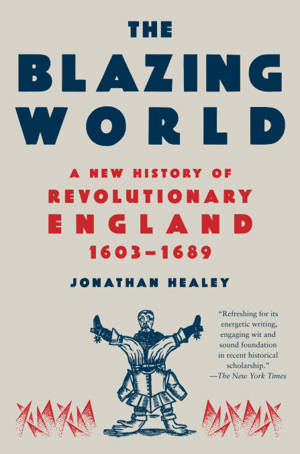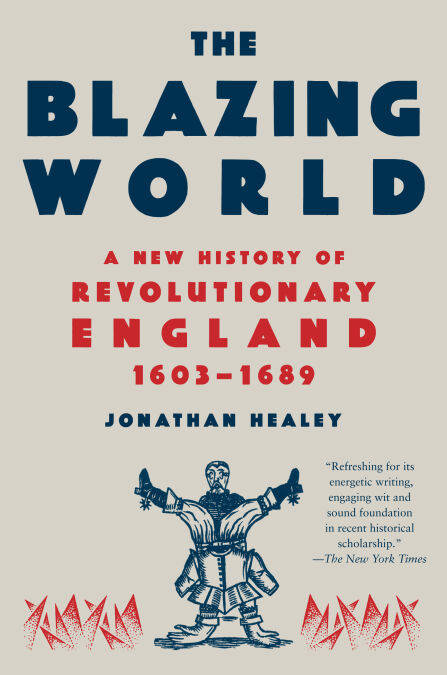
Bedankt voor het vertrouwen het afgelopen jaar! Om jou te bedanken bieden we GRATIS verzending (in België) aan op alles gedurende de hele maand januari.
- Afhalen na 1 uur in een winkel met voorraad
- In januari gratis thuislevering in België
- Ruim aanbod met 7 miljoen producten
Bedankt voor het vertrouwen het afgelopen jaar! Om jou te bedanken bieden we GRATIS verzending (in België) aan op alles gedurende de hele maand januari.
- Afhalen na 1 uur in een winkel met voorraad
- In januari gratis thuislevering in België
- Ruim aanbod met 7 miljoen producten
Zoeken
The Blazing World E-BOOK
A New History of Revolutionary England, 1603-1689
Jonathan Healey
E-book | Engels
€ 6,93
+ 6 punten
Uitvoering
Omschrijving
AN ECONOMIST AND NEW YORKER BEST BOOK OF THE YEAR • A fresh, exciting, “readable and informative” history (The New York Times) of seventeenth-century England, a time of revolution when society was on fire and simultaneously forging the modern world. • “Recapture[s] a lost moment when a radically democratic commonwealth seemed possible.”—Adam Gopnik, The New Yorker
“[Healy] makes a convincing argument that the turbulent era qualifies as truly ‘revolutionary,’ not simply because of its cascading political upheavals, but in terms of far-reaching changes within society.... Wryly humorous and occasionally bawdy”— The Wall Street Journal
The seventeenth century was a revolutionary age for the English. It started as they suddenly found themselves ruled by a Scotsman, and it ended in the shadow of an invasion by the Dutch. Under James I, England suffered terrorism and witch panics. Under his son Charles, state and society collapsed into civil war, to be followed by an army coup and regicide. For a short time—for the only time in history—England was a republic. There were bitter struggles over faith and Parliament asserted itself like never before. There were no boundaries to politics. In fiery, plague-ridden London, in coffee shops and alehouses, new ideas were forged that were angry, populist, and almost impossible for monarchs to control.
But the story of this century is less well known than it should be. Myths have grown around key figures. People may know about the Gunpowder Plot and the Great Fire of London, but the Civil War is a half-remembered mystery to many. And yet the seventeenth century has never seemed more relevant. The British constitution is once again being bent and contorted, and there is a clash of ideologies reminiscent of when Roundhead fought Cavalier.
The Blazing World is the story of this strange, twisting, fascinating century. It shows a society in sparkling detail. It was a new world of wealth, creativity, and daring curiosity, but also of greed, pugnacious arrogance, and colonial violence.
“[Healy] makes a convincing argument that the turbulent era qualifies as truly ‘revolutionary,’ not simply because of its cascading political upheavals, but in terms of far-reaching changes within society.... Wryly humorous and occasionally bawdy”— The Wall Street Journal
The seventeenth century was a revolutionary age for the English. It started as they suddenly found themselves ruled by a Scotsman, and it ended in the shadow of an invasion by the Dutch. Under James I, England suffered terrorism and witch panics. Under his son Charles, state and society collapsed into civil war, to be followed by an army coup and regicide. For a short time—for the only time in history—England was a republic. There were bitter struggles over faith and Parliament asserted itself like never before. There were no boundaries to politics. In fiery, plague-ridden London, in coffee shops and alehouses, new ideas were forged that were angry, populist, and almost impossible for monarchs to control.
But the story of this century is less well known than it should be. Myths have grown around key figures. People may know about the Gunpowder Plot and the Great Fire of London, but the Civil War is a half-remembered mystery to many. And yet the seventeenth century has never seemed more relevant. The British constitution is once again being bent and contorted, and there is a clash of ideologies reminiscent of when Roundhead fought Cavalier.
The Blazing World is the story of this strange, twisting, fascinating century. It shows a society in sparkling detail. It was a new world of wealth, creativity, and daring curiosity, but also of greed, pugnacious arrogance, and colonial violence.
Specificaties
Betrokkenen
- Auteur(s):
- Uitgeverij:
Inhoud
- Aantal bladzijden:
- 512
- Taal:
- Engels
Eigenschappen
- Productcode (EAN):
- 9780593318362
- Verschijningsdatum:
- 10/04/2023
- Uitvoering:
- E-book
- Beveiligd met:
- Adobe DRM
- Formaat:
- ePub

Alleen bij Standaard Boekhandel
+ 6 punten op je klantenkaart van Standaard Boekhandel
Beoordelingen
We publiceren alleen reviews die voldoen aan de voorwaarden voor reviews. Bekijk onze voorwaarden voor reviews.









